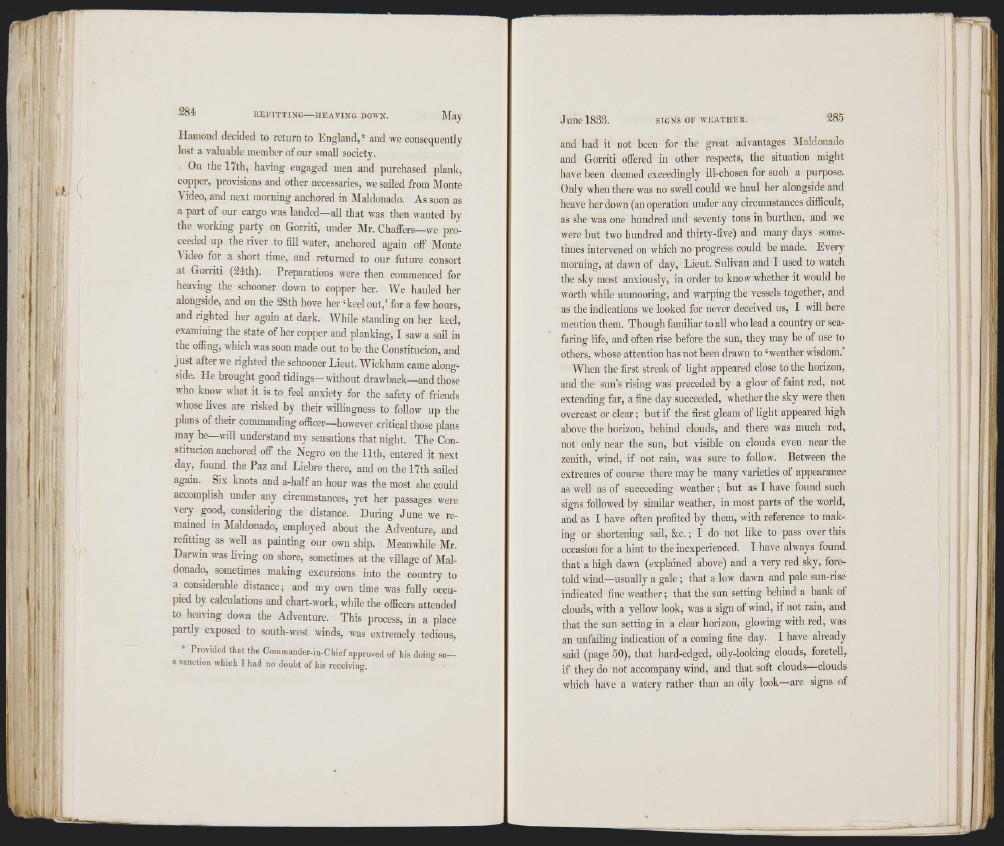
v,(
Í
Hamond decided to return to England,* and we consequently
lost a valuable member of our small society.
On the ITtli, having engaged men and purchased plank,
copper, provisions and other necessaries, we sailed from Monte
Video, and next morning anchored in Maldonado. As soon as
a pai-t of our cargo was landed—all that was then wanted by
the working party on Gorriti, under Mr. Chaffers—we proceeded
up the river to fill water, anchored again off Monte
I ideo for a short time, and returned to our future consort
at Gorriti (24th). Preparations were then commenced for
heaving the schooner down to copper her. We hauled her
alongside, and on the 28th hove her ‘keel out,’ for a few hours,
and righted her again at dark. While standing on her keel,
examining the state of her copper and planking, I saw a sail in
the offing, which was soon made out to be the Constitución, and
just after we righted the schooner Lieut. Wickham came alongside.
He brought good tidings—without drawback—and those
who know what it is to feel anxiety for the safety of friends
whose lives are risked by their -iviUingness to follow up the
plans of their commanding officer—however critical those plans
may b s ^ v ill understand my sensations that night. The Constitución
anchored off the Negro on the 11th, entered it next
day, found the Paz and Liebre there, and on the 17th sailed
again. Six knots and a-half an hour was the most she could
accomplish under any circumstances, yet her passages were
very good, considering the distance. During June we remained
in Maldonado, employed about the Adventure, and
refitting as well as painting our own ship. Meanwhile Mr.
Darwin was bring on shore, sometimes at the village of Maldonado,
sometimes making excursions into the country to
a considerable distance; and my own time was fully occupied
by calculations and chart-work, while the officers attended
to hearing down the Adventure. This process, in a place
partly exposed to south-west winds, was extremely tedious,
* Provided that the Commander-in-Chief approved of his doing so—
a sanction which I had no doubt of his receiving.
and had it not been for the great advantages Maldonado
and Gorriti offered in other respects, the situation might
have been deemed exceedingly ill-chosen for such a purpose.
Only when there was no swell could we haul her alongside and
heave her down (an operation under any circumstances difficult,
as she was one hundred and seventy tons in burthen, and we
were but two hundred and thirty-five) and many days sometimes
intervened on which no progress could be made. Every
morning, at dawn of day, Lieut. Sulivan and I used to watch
the sky most anxiously, in order to know whether it would be
worth while unmooring, and warping the vessels together, and
as the indications we looked for never deceived us, I will here
mention them. Though familiar to all who lead a country or seafaring
life, and often rise before the sun, they may be of use to
others, whose attention has not been drawn to ‘weather wisdom.’
When the first streak of light appeared close to the horizon,
and the sun’s rising was preceded by a glow of faint red, not
extending far, a fine day succeeded, whether the sky were then
overcast or clear; but if the first gleam of light appeared high
above the horizon, behind clouds, and tliere was much red,
not only near the sun, but visible on clouds even near the
zenith, wind, if not rain, was sure to follow. Between the
extremes of course there may be many varieties of appearance
as well as of succeeding weather; but as I have found such
signs followed by similar weather, in most parts of the world,
and as I have often profited by them, with reference to making
or shortening sail, &c.; I do not like to pass over this
occasion for a hint to the inexperienced. I have always found
that a high dawn (explained above) and a very red sky, foretold
wind—usually a gale ; that a low dawn and pale sun-rise
indicated fine weather; that the sun setting behind a bank of
clouds, with a yellow look, was a sign of wind, if not rain, and
that the sun setting in a clear horizon, glowing with red, was
an unfailing indication of a coming fine day. I have already
said (page 50), that hard-edged, oily-looking clouds, foretell,
if they do not accompany wind, and that soft clouds—clouds
which have a watery rather than an oily look—are signs of